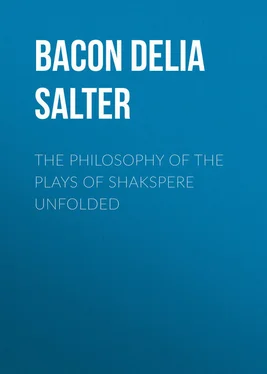Delia Bacon - The Philosophy of the Plays of Shakspere Unfolded
Здесь есть возможность читать онлайн «Delia Bacon - The Philosophy of the Plays of Shakspere Unfolded» — ознакомительный отрывок электронной книги совершенно бесплатно, а после прочтения отрывка купить полную версию. В некоторых случаях можно слушать аудио, скачать через торрент в формате fb2 и присутствует краткое содержание. Жанр: literature_19, foreign_antique, foreign_prose, на английском языке. Описание произведения, (предисловие) а так же отзывы посетителей доступны на портале библиотеки ЛибКат.
- Название:The Philosophy of the Plays of Shakspere Unfolded
- Автор:
- Жанр:
- Год:неизвестен
- ISBN:нет данных
- Рейтинг книги:3 / 5. Голосов: 1
-
Избранное:Добавить в избранное
- Отзывы:
-
Ваша оценка:
- 60
- 1
- 2
- 3
- 4
- 5
The Philosophy of the Plays of Shakspere Unfolded: краткое содержание, описание и аннотация
Предлагаем к чтению аннотацию, описание, краткое содержание или предисловие (зависит от того, что написал сам автор книги «The Philosophy of the Plays of Shakspere Unfolded»). Если вы не нашли необходимую информацию о книге — напишите в комментариях, мы постараемся отыскать её.
The Philosophy of the Plays of Shakspere Unfolded — читать онлайн ознакомительный отрывок
Ниже представлен текст книги, разбитый по страницам. Система сохранения места последней прочитанной страницы, позволяет с удобством читать онлайн бесплатно книгу «The Philosophy of the Plays of Shakspere Unfolded», без необходимости каждый раз заново искать на чём Вы остановились. Поставьте закладку, и сможете в любой момент перейти на страницу, на которой закончили чтение.
Интервал:
Закладка:
'Lyncestes accused of conspiracy against Alexander , the day that he was brought out before the army, according to the custom, to be heard in his defence, had prepared a studied speech , of which, haggling and stammering , he pronounced some words . As he was becoming more perplexed and struggling with his memory, and trying to recollect himself , the soldiers that stood nearest killed him with their spears, looking upon his confusion and silence as a confession of his guilt: very fine, indeed! The place, the spectators, the expectation, would astound a man even though were there no object in his mind but to speak well ; but WHAT when 'tis an harangue upon which his life depends ?' You that happen to be of my ear, it is my style that we are speaking of, and there is my story.
' For my part the very being tied to what I am to say, is enough to loose me from it ' – that is the cause of his wandering – ' The more I trust to my memory , the more do I put myself out of my own power, so much as to find it in my own countenance , and have sometimes been very much put to it to conceal the slavery wherein I was bound , whereas my design is to manifest in speaking a perfect nonchalance , both of face and accent, and casual and unpremeditated motions , as rising from present occasions, choosing rather to say nothing to purpose, than to show that I came prepared to speak well ; a thing especially unbecoming a man of my profession . The preparation begets a great deal more expectation than it will satisfy; a man very often absurdly strips himself to his doublet to leap no further than he would have done in his gown .' [Perhaps the reflecting scholar will recollect to have seen an instance of this magnificent preparation for saying something to the purpose, attended with similarly lame conclusions; but, if he does not, the story which follows may tend to refresh his memory on this point.] 'It is recorded of the orator Curio, that when he proposed the division of his oration into three or four parts, it often happened either that he forgot some one, or added one or two more.' A much more illustrious speaker, who spoke under circumstances not very unlike those in which the poor conspirator above noted made his haggling and fatal attempts at oratory, is known to have been guilty of a similar oversight; for, having invented a plan of universal science, designed for the relief of the human estate, he forgot the principal application of it. But this author says, I have always avoided falling into this inconvenience, having always hated these promises and announcements, not only out of distrust of my memory, but also because this method relishes too much of the artificial . You will find no scientific plan here ostentatiously exhibited; you will find such a plan elsewhere with all the works set down in it, but the works themselves will be missing; and you will find the works elsewhere, but it will be under the cover of a superficial and transitory show, where it would be ruinous to produce the plan, ' I have always avoided falling into this inconvenience. Simpliciora militares decent .' But as he appears, after all, to have had no military weapon with which to sustain that straight-forwardness of speech which is becoming in a military power, and no dagger to pursue his points with, some artifice, though he professes not to like it, may be necessary, and the rule which he here specifies is, on the whole, perhaps, not altogether amiss. ''Tis enough that I have promised to myself never to take upon me to speak in a place where I owe respect; for as to that sort of speaking where a man reads his speech, besides that it is very absurd, it is a mighty disadvantage to those who naturally could give it a grace by action , and to rely upon the mercy of the readiness of my invention, I will much less do it; 'tis heavy and perplexed, and such as would never furnish me in sudden and important necessities.'
'Speaking,' he says in another place, 'hurts and discomposes me, – my voice is loud and high, so that when I have gone to whisper some great person about an affair of consequence, they have often had to moderate my voice. This story deserves a place here .
'Some one in a certain Greek school was speaking loud as I do . The master of the ceremonies sent to him to speak lower . "Tell him then, he must send me," replied the other, "the tone he would have me speak in." To which the other replied, "that he should take the tone from the ear of him to whom he spake." It was well said, if it be understood. Speak according to the affair you are speaking about to the auditor, – (speak according to the business you have in hand, to the purpose you have to accomplish) – for if it mean, it is sufficient that he hears you, I do not find it reason.' It is a more artistic use of speech that he is proposing in his new science of it, for as Lord Bacon has it, who writes as we shall see on this same subject, 'the proofs and persuasions of rhetoric ought to differ according to the auditors,' and the Arts of Rhetoric have for their legitimate end, 'not merely PROOF, but much more , IMPRESSION.' 'For many forms are equal in signification which are differing in impression , as the difference is great in the piercing of that which is sharp , and that which is flat , though the strength of the percussion be the same; for instance, there is no man but will be a little more raised, by hearing it said, "Your enemies will be glad of this," than by hearing it said only, "This is evil for you."' But it is thus that our Gascon proceeds, whose comment on his Greek story we have interrupted. 'There is a voice to flatter , there is a voice to instruct , and a voice to reprehend . I would not only have my voice to reach my hearer, but peradventure that it strike and pierce him. When I rate my footman in a sharp and bitter tone, it would be very fine for him to say, "Pray master, speak lower, for I hear you very well." Speaking is half his that speaks , and half his that hears ; the last ought to prepare himself to receive it, according to its motion, as with tennis players; he that receives the ball, shifts, draws back, and prepares himself to receive it, according as he sees him move, who strikes the stroke, and according to the stroke itself.' It is not, therefore, because this author has failed to furnish the rules of interpretation necessary for penetrating to the ultimate intention of this new kind of speaking, if all this affectation of simplicity, and all these absurd contradictory statements of his, have been suffered hitherto to pass unchallenged. It is the public mind he has to deal with. 'That which he adores in kings is the throng of their adorers .' If he should take the public at once into his confidence, and tell them beforehand precisely what his own opinions were of things in general, if he should set before them in the outset the conclusions to which he proposed to drive them, he might indeed stand some chance to have his arguments interrupted, or changed with a magisterial authority; he would indeed find it necessary to pursue his philosophical points with a dagger in his hand.
And besides, this dogmatical mode of teaching does not appear to him to secure the ends of teaching. He wishes to rouse the human mind to activity, to compel it to think for itself, and put it on the inevitable road to his conclusions. He wishes the reader to strike out those conclusions for himself, and fancy himself the discoverer if he will. So far from being simple and straightforward, his style is in the profoundest degree artistic, for the soul of all our modern art inspired it. He thinks it does no good for scholars to call out to the active world from the platform of their last conclusions. The truths which men receive from those didactic heights remain foreign to them. 'We want medicines to arouse the sense,' says Lord Bacon, who proposed exactly the method of teaching which this philosopher had, as it would seem, already adopted. 'I bring a trumpet to awake his ear , to set his sense on the attentive bent, and then to speak,' says that poet who best put this art in practice.
Читать дальшеИнтервал:
Закладка:
Похожие книги на «The Philosophy of the Plays of Shakspere Unfolded»
Представляем Вашему вниманию похожие книги на «The Philosophy of the Plays of Shakspere Unfolded» списком для выбора. Мы отобрали схожую по названию и смыслу литературу в надежде предоставить читателям больше вариантов отыскать новые, интересные, ещё непрочитанные произведения.
Обсуждение, отзывы о книге «The Philosophy of the Plays of Shakspere Unfolded» и просто собственные мнения читателей. Оставьте ваши комментарии, напишите, что Вы думаете о произведении, его смысле или главных героях. Укажите что конкретно понравилось, а что нет, и почему Вы так считаете.












